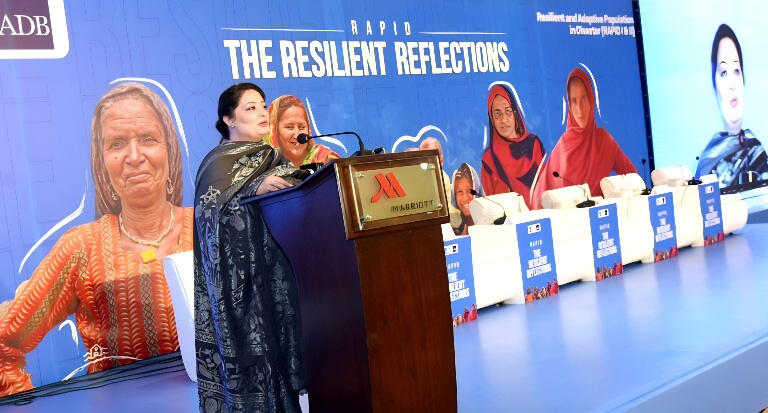Islamabad, Sep 30: Romina Khurshid Alam, the Prime Minister’s Climate Change Coordinator, stated that equipping populations at risk of natural disasters with the means and know-how to withstand the effects of frequent and severe natural disasters is essential to lowering their susceptibility over time.
It is obvious that improving communities’ preparedness, response, and recovery from natural catastrophes will increase their climate resilience when the required training and resources are made available. She emphasized that providing people with the tools and resources they need can result in sustainable livelihoods and aid in the economic, social, and psychological recovery of communities affected by disasters.
At the high-level discussion “The Resilient Reflections” on Monday, Romina gave the keynote address and emphasized the interconnectedness of communities, infrastructure, and ecosystems. Increasing resilience in one area has a positive knock-on effect on the others, making the environment more adaptable and sustainable as a whole.
Romina Khurshid emphasized the value of equipping communities with the knowledge, resources, and skills they need to be resilient to disasters. She said that empowered communities are better able to endure and recover from natural disasters.But “we can enhance the safety and well-being of our climate-vulnerable communities by promoting local leadership and offering information on disaster planning, resources, and skills to recover,” the speaker stated.
Senior representatives from federal and provincial organizations, as well as national and international non-governmental organizations, academia, researchers, and the media, attended the event, which was organized in collaboration with the Climate Change & Environmental Coordination Ministry by Islamic Relief, the National Disaster Risk Management Fund (NDRMF), and the Asian Development Bank.
She went on to say that the current government in Pakistan is working with relevant stakeholders to develop the resilience and adaptive capacity of communities, their livelihoods, ecosystems, and public infrastructures, as the country continues to struggle with the worsening effects of climate change, such as extreme weather events, flooding, and resource scarcity.
Romina Khurshid explained to the attendees that developing resilience is not only a tactic but also a need for our future, which is in jeopardy due to the intensifying climate disaster. The PM’s climate aide stated, “To achieve a resilient future, there is a dire need for all stakeholders, including federal and provincial government organizations and other national and international civil society organizations to work closely to empower vulnerable communities with skills and resources, strengthen public infrastructure, and protect ecosystems to navigate the challenges ahead for sustainable and resilient future.”
Romina Khurshid Alam stated that improving infrastructure is essential for maintaining public safety and economic stability. She also mentioned that modernizing water management systems, bridges, and highways makes them more resilient to the effects of climate change and lowers the likelihood of catastrophic failures.
She acknowledged that Pakistan faces a variety of dangers, such as periodic flooding, droughts, and seismic activity, and stated that it is critical to empower local populations by implementing a comprehensive strategy that incorporates environmental sustainability, disaster risk reduction, and community participation.
Romina Khurshid Alam emphasised, “We can help the voices of the climate-vulnerable communities get heard and considered in decision-making processes, ultimately leading to a more equitable and resilient society, by fostering an inclusive environment for communities to sustain, recover, and thrive in the disaster times.”









